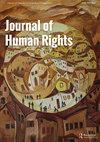“It’s like living in a black hole”: Reevaluating the use of solitary confinement during COVID-19
IF 1.6
2区 社会学
Q3 INTERNATIONAL RELATIONS
引用次数: 0
Abstract
Abstract COVID-19 has been unprecedented in many ways, including the drastic changes to the activities and behaviors that shape our everyday lives, particularly the practice of physical distancing and self-isolation. Moreover, the pandemic has highlighted the damaging effects of going “stir crazy,” loneliness, and the restrictions on people’s civil liberties, as demonstrated by the impact that self-isolation is having on people’s mental health and well-being. However, the science behind self-isolation and quarantine is designed to prevent the spread of disease and to save lives. Meanwhile, prisoners and prisoner’s rights advocates have long been arguing that the curtailment of civil liberties in prisons, especially the use of solitary confinement, is a human rights violation and is intentionally designed to be punitive and proven to have devastating effects on one’s mental (and physiological) health. Therefore, the COVID-19 pandemic has helped to highlight the need to revisit the practice of solitary confinement in prisons. In this article, by using Orlando Patterson’s theory on social death, I will examine the practice of solitary confinement, and the detrimental impact it has on one’s health amid this “new normal.”“这就像生活在黑洞里”:重新评估新冠肺炎期间单独监禁的使用
本文章由计算机程序翻译,如有差异,请以英文原文为准。
求助全文
约1分钟内获得全文
求助全文

 求助内容:
求助内容: 应助结果提醒方式:
应助结果提醒方式:


